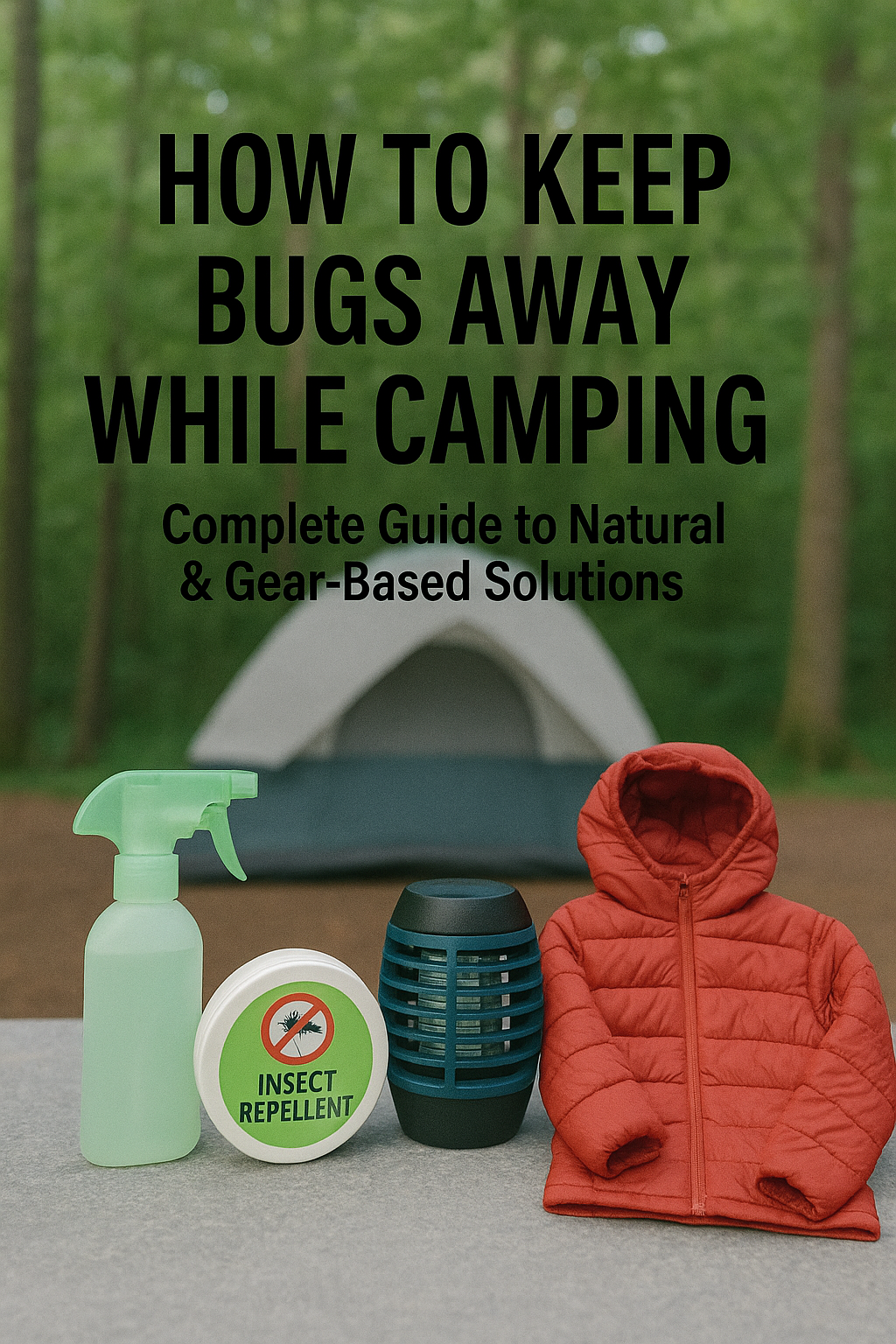Camping is about reconnecting with nature, unplugging from daily stress, and soaking in the fresh air — but nothing ruins that faster than a swarm of bugs. Whether you’re dodging mosquitoes, battling black flies, or swiping at gnats near the lantern, bugs can quickly turn a peaceful evening into a scratch-fest. The good news? With the right knowledge and gear, you can drastically reduce bug encounters while camping.
This article is part of our outdoor survival series. For a deeper dive into all insect-related advice, check out our Ultimate Guide to Bug-Free Camping (coming soon).
- 🦟 Why Bugs Are a Bigger Problem While Camping
- 🌿 Natural Ways to Repel Bugs While Camping
- 🧢 Clothing Tricks to Stay Bite-Free
- 🛠️ Best Gear to Keep Bugs Away (Top Picks)
- 📊 Quick Comparison Table: Bug Repelling Gear
- ✅ Bug-Free Camping Checklist
- 🙋♀️ FAQ: Camping & Bug Prevention
- 🌄 Final Thoughts: Camp Smarter, Not Itchier
🦟 Why Bugs Are a Bigger Problem While Camping
Bug issues intensify at campsites due to ideal conditions like exposed skin, food odors, stagnant water, and warm body temperatures. Mosquitoes, ticks, flies, and gnats thrive in nature — especially in forested or humid zones. Understanding what draws bugs in is the first step to blocking them out.

🌿 Natural Ways to Repel Bugs While Camping
If you’re looking for non-toxic, environmentally friendly alternatives to traditional repellents, here are natural remedies campers swear by. These methods work best when combined for layered protection:
- Burn sage or rosemary: Toss dried bundles into your campfire (if allowed) — the aromatic smoke naturally repels mosquitoes.
- Essential oil blends: Combine citronella, lavender, tea tree, or eucalyptus oils with a carrier like coconut oil and apply to pulse points.
- DIY natural spray: Mix witch hazel, lemon eucalyptus oil, and water in a reusable spray bottle for a budget-friendly, chemical-free repellent.
- Light-colored clothing: Mosquitoes and biting flies are more attracted to dark hues. Opt for whites, khakis, and pastels instead.
- Citronella candles or coils: Ideal for picnic tables or seating areas. Use them outdoors only for safe vapor release.
🧢 Clothing Tricks to Stay Bite-Free
Don’t underestimate the power of what you wear — it can be your first and best line of defense against insects. These tips combine fashion with function:
- Dress in long sleeves and pants: Especially important during dusk and dawn when mosquitoes are most active.
- Go synthetic or insect-treated: Certain fabrics are designed to resist bugs or wick sweat that attracts them.
- Tuck pants into socks: Not stylish, but essential in tick-prone grassy or wooded areas.
- Use permethrin spray: Treat clothes and gear (but never your skin) for up to 6 weeks of built-in protection.
🛠️ Best Gear to Keep Bugs Away (Top Picks)
When you're deep in the backcountry or battling heavy bug populations, natural solutions may not cut it. These tested products make a massive difference:
- Thermacell MR450 Mosquito Repeller – A battery-powered device that creates a scent-free, flame-free 15-foot bug barrier — great for relaxing by the tent or fire.
- Sawyer Picaridin Lotion – DEET-free with up to 14 hours of protection. Safe for gear and doesn’t leave an oily residue.
- Coghlan’s Mosquito Net – Lightweight mesh barrier to hang over beds, hammocks, or cots. A must-have for tropical or humid climates.
- OFF! Deep Woods Towelettes – Convenient, travel-ready packets for fast application — no mess or overspray.
📊 Quick Comparison Table: Bug Repelling Gear
| Product | Type | Best For |
|---|---|---|
| Thermacell MR450 | Electronic Repeller | Relaxing at camp, meals, chairs |
| Sawyer Picaridin Lotion | Topical Lotion | Hikes, day trips, general wear |
| Coghlan’s Net | Physical Barrier | Sleeping zones, hammock setups |
✅ Bug-Free Camping Checklist
Print this or add it to your phone before your next trip. Here’s what every camper should pack to stay itch-free outdoors:
- DIY essential oil spray or pre-mixed natural repellents
- DEET or Picaridin-based repellent (spray or lotion)
- Permethrin-treated clothing or permethrin spray
- Mosquito net or bug screen tent
- Thermacell repeller or similar zone protection device
- Light-colored, long-sleeved clothing
- Citronella candles, sticks, or coils (for outdoor use only)
- Sealable food containers and trash bags
🙋♀️ FAQ: Camping & Bug Prevention
Can I sleep in a tent without bug spray?
Yes — as long as your tent is fully zipped, intact, and bug-tight. However, spraying the exterior or using a bug net adds extra protection, especially near lights or doorways.
What time of day are bugs the worst?
Mosquitoes are most active at dawn and dusk. Ticks tend to be active during daylight hours in grassy or wooded areas.
Do campfires really help with bugs?
To some extent. Smoke can discourage flying insects, but for stronger results, add herbs like rosemary or sage to the fire.
🌄 Final Thoughts: Camp Smarter, Not Itchier
Bug-free camping is possible with the right gear, preparation, and awareness. From permethrin-treated clothing to essential oils and high-tech repellents, your defense strategy should be layered and location-appropriate. Try combining natural solutions with proven products to enjoy your camping trip — without the constant swatting.
Still planning your trip? Don’t forget to check out our upcoming Ultimate Bug-Free Camping Guide for even more detailed tips, gear reviews, and site-specific strategies.
